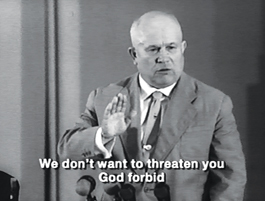home | metro santa cruz index | movies | current reviews | film review

Waiter, There's An Angel of Death in My Set: The panic over Sputnik seems quaint now, but at the time Soviet President Nikita Khruschev's every word was parsed by anxious American audiences.
'Sputnik Mania'
A new documentary by Santa Cruz filmmaker David Hoffman shows how the world almost scared itself to death on the way to the Space Age.
By Richard von Busack
On camera, Walter Cronkite offers his viewers a choice: "Do we end in a nuclear war, or live in constant fear of one?" Faced with these two possibilities, the human race nobly chose the latter. Echoes of the great fear have persisted into our day. Sputnik Mania, directed by David Hoffman and edited and co-produced by John Vincent Barrett, both of Santa Cruz, demonstrates how the worst of that panic began. The documentary is screening Jan. 27 in a special preview benefit for the Spring Hill Academy.
There's a wealth of archival footage here—including some of the most dismally hilarious Civil Defense and propaganda films this side of The Atomic Café. The International Documentary Association liked it so much it awarded the film top honors for its use of those old reels.
Adapting co-writer Paul Dickson's book Sputnik: The Scare of the Century, Hoffman follows a dangerous—nearly lethal—year in the history of the world. The two major powers, the United States and the USSR, were led by lumpy, bald ex-soldiers so physically alike that they could have been brothers. Through the media available at the time, they took shots at one another. Dickson and Hoffman repeat the claim that the USSR's leader, the truculent Nikita Khruschev, had repeatedly said his nation would "bury" the United States (I may be wrong, but I've heard that Soviet slur translated as "we will leave you in the dust," changing an undertaker's threat to the boast of a race car driver.)
Though troubled by fears of the atheist beet-farmers waiting to toss dirt on us, America, under the leadership of Dwight Eisenhower, still drowsed through the consumerist picnic that was the 1950s. That picnic was about to be disturbed by ants. Red ants.
On Oct. 4, 1957, the Soviet Union announced the launching of the first space satellite: Sputnik, a beach-ball-size orb with four protruding antennas. At 18,000 miles per hour, the satellite broadcast its finchlike beeps to the globe. Measured applause for this scientific feat occurred everywhere from The New York Times to John Glenn ("It's out of this world!" Glenn jested, sort of).
Now, for those considering the Injured Party as a possible alternative name for the Democrats, I can say that, as someone raised to feel that the Blue Team is always the one that has to clean up after the Elephants, Sputnik Mania comes up with some little-known history. The Republican Eisenhower tried to frame Sputnik as a triumph of science—"it does not raise my apprehension one iota," he said. Seizing the issue, Democrats (and right-wing fulminators, tired of Ike's moderation) blew up like proverbial rockets themselves. Later president Lyndon Johnson noted in his diary, "I felt uneasy. In Texas, we live close to the sky. In some ways our skies seem alien."
Sens. Hubert Humphrey and Scoop Jackson scolded the White House for not treating Sputnik as an emergency. The press also went nuts. Sputnik Mania quotes a particularly fragrant S.F. Chronicle editorial claiming Sputnik was "a frightening toy in the hands of child-like men."
And then the second blow fell. On Nov. 3, 1957, the Russians launched Sputnik 2, containing a live dog named Laika. The drama of this event electrified the world. The satellite, quickly nicknamed "Muttnik," turned tragic when it became apparent that the USSR had better plans for getting the dog up than for bringing him home. Secretly the American intelligence services worried about the Soviets' ability to send up a 1-ton-plus payload, with enough room for a nuclear warhead. The Cold War deepened as America struggled to catch up with the Russians. American amateur rocketeers blew their digits off in homemade missile experiments ("They were pipe bombs with fins," remembers one later rocket scientist). And Eisenhower reluctantly turned to the military to develop better missile technology. The head man was the brilliant ex-Nazi Wernher Von Braun, who had been busy during the war figuring out ways to renovate London with V2 missiles.
Hoffman's rewarding documentary assembles everything from vintage toy commercials to interviews with Sergei Khruschev. Since you're alive to read this, you know the film has a happy ending. The two elderly rivals met at Camp David and admitted to one another that they were being pressured by their generals to blow their economies on new weapons. Thus Eisenhower created NASA, a civilian agency to explore space. This commences the ascent to the moon, and the terror of Sputnik gave way to a triumph meant for all mankind.
![]() SPUTNIK MANIA screens Sunday, Jan. 27, at 5pm at the Rio Theatre, 1205 Soquel Ave., Santa Cruz. Tickets are $10/children under 10 free; 831.423.8209.
SPUTNIK MANIA screens Sunday, Jan. 27, at 5pm at the Rio Theatre, 1205 Soquel Ave., Santa Cruz. Tickets are $10/children under 10 free; 831.423.8209.
Send a letter to the editor about this story.
|
|
|
|
|
|